
Social vulnerability to natural hazards has become a topical issue in the face of climate change. For disaster risk reduction strategies to be effective, prior assessments of social vulnerability have to be undertaken.
The following is a list of all conten labeled as "Climate Change"

Social vulnerability to natural hazards has become a topical issue in the face of climate change. For disaster risk reduction strategies to be effective, prior assessments of social vulnerability have to be undertaken.
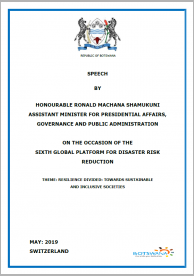
Speech by honourable Ronald Machana Shamukini Assistant Minister for Presidential Affairs, Governance and Public Administration on the occasion of the Sixth Global Platform for Disaster Risk Reduction 2019 (Geneva, Switzerland; 13-17 May, 2019).
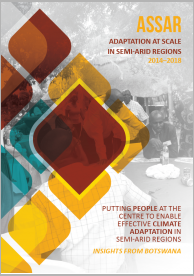
Semi-arid regions like eastern Botswana are highly dynamic systems that experience variable and sometimes extreme climates, adverse environmental change, and a relative paucity of and decline in natural resources. Historically, people living in these regions have adopted several coping mechanisms to deal with these conditions.
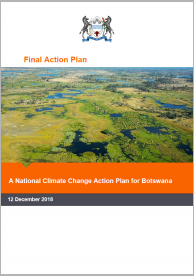
This action plan serves as a companion document to the Botswana National Climate Change Strategy of 2018. It provides a clear pathway for the implementation and monitoring of the strategy by providing targets and indicators for each strategy.
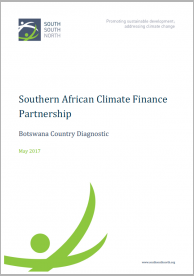
The Southern Africa Climate Finance Partnership (SACFP) seeks to develop a regional partnership between six countries (Botswana, Lesotho, Namibia, South Africa, Zambia and Zimbabwe) to support country-owned and managed climate finance portfolios that can be financed through the Green Climate Fund (GCF) and other climate finance avenues, and mobilise private investment where possible.
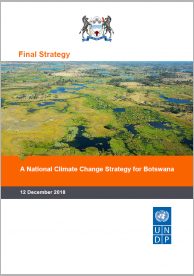
This strategy is designed to provide the impetus for Botswana taking long strides on adaptation and mitigation, whilst meeting its socio-economic development goals, realizing Vision 2036, and achieving the UN Sustainable Development Goals (SDGs).
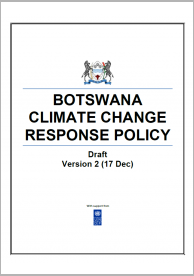
The goal of this policy is to mainstream sustainability and climate change into development planning and in so doing, enhance Botswana’s resilience and capacity to respond to existing and anticipated climate change impacts.

The eleventh National Development Plan (NDP 11) is the first medium-term plan towards the implementation of the country’s second vision - Vision 2036. The Plan will run from 1st April 2017 to 31st March 2023.
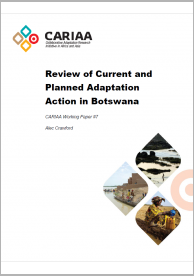
Climate change presents a very real challenge to Botswana’s continued development and relative prosperity.

This strategy aims to achieve the following objectives: